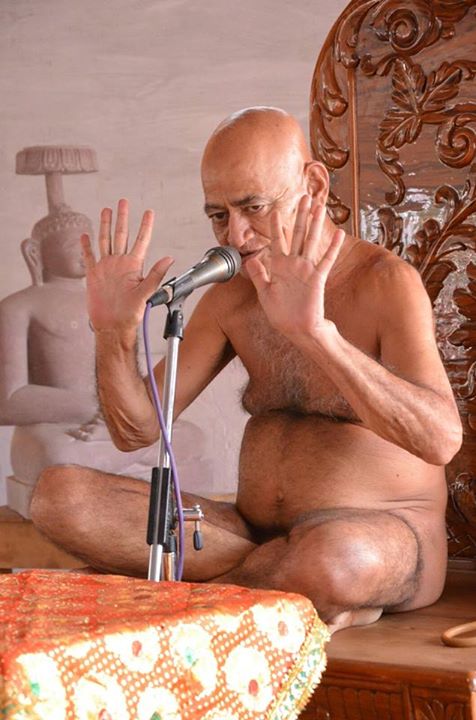News in Hindi
 Source: © Facebook
Source: © Facebook
✿ प्रथम तीर्थंकर ऋषभदेव के पुत्र भरत चक्रवर्ती के नाम पर भारत नाम पड़ा ✿ Jainism -the Philosophy!!
भारत नाम की उत्पति का सम्बंध प्राचीन भारत के चक्रवर्ती सम्राट, मनु के वंशज भगवान ऋषभदेव के पु्त्र भरत से है। भरत एक प्रतापी राजा एवं महान भक्त थे। श्रीमद्भागवत के पञ्चम स्कन्ध एवं जैन ग्रन्थों में उनके जीवन एवं अन्य जन्मों का वर्णन आता है।
श्रीमद्भागवत के अनुसार:[1]
येषां खलु महायोगी भरतो ज्येष्ठः श्रेष्ठगुण आसीद्येनेदं वर्षं भारतमिति व्यपदिशन्ति॥९॥
उनमें (सौ पुत्रों में) महायोगी भरतजी सबसे बड़े और सबसे अधिक गुणवान् थे। उन्हीं के नाम से लोग इस अजनाभखण्ड को भारतवर्ष कहने लगे॥९॥
एक अन्य मत जो कि आमतौर पर पाठ्य पुस्तकों में प्रचलित है, के अनुसार दुष्यन्त और शकुन्तला के पुत्र भरत के नाम पर भारत नाम पड़ा। परन्तु विभिन्न स्रोतों में वर्णित तथ्यों के आधार पर यह मान्यता गलत साबित होती है। पूरी वैष्णव परम्परा और जैन परम्परा में बार-बार दर्ज है कि समुद्र से लेकर हिमालय तक फैले इस देश का नाम प्रथम तीर्थंकर दार्शनिक राजा भगवान ऋषभदेव के पुत्र भरत के नाम पर भारतवर्ष पड़ा। इसके अतिरिक्त जिस भी पुराण में भारतवर्ष का विवरण है वहां इसे ऋषभ पुत्र भरत के नाम पर ही पड़ा बताया गया है।
इन तथ्यों के देखकर प्रश्न उत्पन्न होता है कि यह धारणा कहाँ से आई कि दुष्यन्त-शकुन्तला के पुत्र भरत के नाम पर इस देश का नाम भारत हुआ? इस सम्बंध में ध्यान देना होगा कि सातवें मनु के आगे दो वंश हो गए थे पहला इक्ष्वाकु या सूर्यवंश और दूसरा चन्द्रवंश। इसी चन्द्रवंश में दुष्यन्त-शकुन्तला के पुत्र भरत का जन्म हुआ। ब्रह्मवैवर्त पुराण में उल्लेख है- "चक्रवर्ती सुतो जज्ञे दुष्यन्तस्य महात्मनः शकुन्तलायाँ भरतो यस्य नाम्तु भारताः" अर्थात्- "महात्मा दुष्यन्त का शकुन्तला से चक्रवर्ती पुत्र उत्पन्न हुआ जिसकी उपाधि भारत हुई"। इस भरत वंश के लोग भारत कहलाए। यहाँ भारताः से इस भारत की धारणा की गई। जबकि यह भरत के वंशजों से जुड़ी उपाधि है। इस सन्दर्भ में गीता के विभिन्न श्लोक देखे जा सकते हैं जिनमें भगवान श्रीकृष्ण, अर्जुन को भारत कह कर सम्बोधित करते हैं जैसे- "यदा यदा हि धर्मस्य ग्लानिर्भवति भारत"।
इसके अतिरिक्त ऋषभ पुत्र भरत तथा दुष्यन्त पुत्र भरत में छः मन्वन्तर का अन्तराल है। अतः यह देश अत्यन्त प्राचीन काल से ही भारत है।
❖ ♫ www.jinvaani.org @ Jainism' e-Storehouse ❖
 Source: © Facebook
Source: © Facebook
✿ The story of digamber saints...... ✿ Jainism -the Philosophy!!
'Dig' means directions & 'Amber' means sky. For digamber saints, the sky is their clothing; they do not wear anything in cold, winter and scorching summers. They sleep on wooden planks and deny all comforts in life. They walk bare footed in all direction for miles because they believe in 'ahinsa' & are careful; they do not hurt any living creature. They keep moving from place to place to avoid arousal of sense of possessiveness. These saints lead an ascetic life & it is very hard to understand the kind of penance they undertake. They pluck or uproot their hair frequently by pulling them one by one to test their patience and will power. They fast and meditate in the desert. In order to control their mind, they practice controlling their body. They have meal only once a day in a standing posture using their palms as a plate at around 10:00 a.m. and will not have even water till the next morning meal. Most of the saints do not take salt & sugar in their meals because they say it is only the intake of salt & sugar that arouses all the flavors in life. In the journey of salvation the body is essential vehicle and so we have to fill it with gasoline but taste is not necessary. Acharya Vidyasagarji maharaj is living without salt and sugar for last 42 years. The tolerance of this saint is amazing. Acharya sanmatisagarji is a great example who only took curd and water for more than 5 years. When they fall seriously ill or in old age- they take up 'Samadhi' which means giving up food and water & welcoming death. This is called the art of dying which is most difficult truth to be faced by each human being.....
>>> Humbleness as described by Acharya Shri Vidhyasagar maharaj ji...
When humbleness emerges from the depth of the heart, it radiates its light in all directions. It is visible in the form of aura around the face. It shoots out through the eyes; it is felt in the words and exhibited in the behavior. A man, who is endowed with the attribute of humbleness, desires that all must posses this trait only then higher level of development can be achieved. An humble man is, one who is humble and unmoved by someone who is always abusive, cursive and critic of others..
Once a gentleman asked a question to acharya shri, "Maharaj, you don't care to offer seats to those who call on you off and on. "you lack basic politeness in your manners". acharya shri listened to him with patience and replied, " brother- How can there be similarity between the humbleness of a saint and that of yours? how can i say to you "come and take your seat"? what right have i to ask yo
u to take your seat? Does the place for allotment of seat belong to me? it is quite possible that someone might have called on me just for 'Darshan' (a glimpse only). in the same way i cannot ask any one to go away. I have no right to grant permission for coming or going. I cannot confirm the process of arrival and departure. suppose someone wants to go by train or by bus, how can i grant or reject permission to go by train or by bus - which i have given up years ago. Moreover, if some one has come merely for evaluation of myself, he will be successful and i find myself defeated. The 'Acharayas' have instructed the 'Munis' that they must simply bless the devotees by rasing their hand and radiate the brilliance of their face.
Nothing is required nor desired to be done beyond this.
Friendship for all living beings, gladness for those who have better qualities, compassion for the distressed or aloofness for the rude people or opponents is an aphorism from Tattvarthsutra.
The feelings of disrespect cannot be found in the heart of muni. He treats a person like a friend even if that man speaks ill of the Muni.The heart of muni is full up to brim with the feeling of universal welfare.
humbleness signifies respect, honor and worship.
>>> Vows (pratigya or promise) as discribed by Acharya Shri Vidhyasagar maharaj ji...
If there are no hindrances in the observance of 'vow', it leaves such unique impression on the soul and mind that benefits not only the observer but those who come in his contact, are also equally benefited.
Once there was a bhikshuk; he reached the door of a house for begging a loaf of bread. he was not at all perturbed even after receiving rough refusal for granting alms(daan). On the way an inspector took pity on him and decided to give alms to bhikshuk. By this time the bhikshuk had gone forward, so the inspector ordered a servant to take a loaf of bread and give it to bhikshuk. The bhikshuk refused to accept the alms as it is the product of illegal gratification. saying so, the bhikshuk went on his way.
the servant delivered the message of the bhikshuk to the inspector. The words of the bhikshuk had such a magic effect on the heart of the inspector that he bade good bye to bribery for good. the vow of the bhikshuk transformed the ways of inspector. Those, who earn money by illegal means try to be more benevolent in donating liberally for the religious cause. They fail to understand that 'Dharma' can only be earned by donating the sum that has been earned by sweat of the brow.
there is a saying that a man does not live by bread alone. one can reach a higher level of life by observing penance and leading a well ordered and disciplined life. Even the teerthankars lead their life in accordance with the observance of chaste life within the norms of 'Jainism'.
Once, a Brahmin gentleman asked Acharya shri, ' Maharaj' you are very hard hearted. You do not accept the aahaar of the person who offers it to you. Aacharya shri tried to explain that the karma of the donor and acceptor must be flawless. The donor cannot compel the acceptor to accept the Aahar as there are certain vows undertaken by the Vower 'Acceptor'and as such Acceptor cannot accept the aahaar unless there is fulfillment of the vows undertaken by him.
if all persons lead life in accordance with the vows undertaken by then, they are bound to be successful in their life. the saffron has not to undertake any kind of vow for spreading the fragrance as it itself spreads in the atmosphere naturally. the same is true about this vow 'Niratichar Vrat' to which munis are particularly fully conscious and active in its observance....
❖ ♫ www.jinvaani.org @ Jainism' e-Storehouse ❖
 Source: © Facebook
Source: © Facebook
✿ आगम का सेवन, युक्ति का अवलम्बन, परम्परा गुरु का उपदेश तथा स्वानुभव -Scripture context + Logic + Ascetic Preaching + Your experince = all together makes sense and connect to inspect what correct!! ✿ Jainism -the Philosophy!
जैन धर्म परीक्षा प्रधानी है।जैन न्याय में हमें प्रयोजनभूत तत्त्व में सत्य-असत्य, खरे-खोटे की परीक्षा करना सिखाया जाता है। सभी मत-मजहबवाले अपने मत को सच्चा और अन्य मत को झुठा कहते हैं। तो सच्चे-झुठे का निर्णय करने का उपाय हमें जैन न्याय में सीखने को मिलता है।
'न्यायविद्या ' वस्तु के सत्य स्वरूप को देखने की कला सिखाती है। न्यायविद्या अर्थात् परीक्षा, समीक्षा।किसी भी वस्तु,तथ्य, सिद्धान्त या मान्यता के बारे में वह दोषरहित, निर्दोष है या नहीं यह जाँचना-परखना और निर्णय करना ही परीक्षा है।
न्यायविद्या शाश्वत काल से ही सर्व विद्याओं का प्रदीप,सर्वकर्मों का उपाय और सर्वधर्मों का आश्रय मानी गई है।
न्यायालय में न्याय देवता के हाथ में एक तराजू होता है(जो मध्यस्थभाव का प्रतिक), परंतु उसके आँखों पर कालीपट्टी होती है। वह इसलिए नहीं कि न्याय अंधा होता है। बल्कि इसलिए कि बिना किसी पक्षपात को देखे सच्चा न्याय ले सके।
पक्षपातो न मे वीरे, न द्वेषः कपिलादिषु।
युक्तिमद् वचनं यस्य,तस्य कार्यः परिग्रहः ।।38।।
आ. हरिभद्रसूरि(लोकतत्त्वनिर्णय)
अर्थ:- मुझे महावीर जिनेन्द्र से कोई पक्षपात नहीं है और अन्य कपिलादि से कोई द्वेष नहीं है, परन्तु जिसके वचन युक्तिसंगत हों उसी का ग्रहण करना चाहिए।
न्यायविद्या (परीक्षा) में पक्षपातरहित, आग्रह एवं स्वार्थ से रहित होकर निष्पक्षरूप से आकलन किया जाता है। परीक्षा निष्पक्ष व निराग्रही होती है। समीचीन तत्त्वजिज्ञासुओं के लिए न्यायविद्या का ज्ञान अपेक्षित है, परम आवश्यक है।
जैन न्याय के शास्त्रों की ऐसी आज्ञा है कि - आगम का सेवन, युक्ति का अवलम्बन, परम्परा गुरु का उपदेश तथा स्वानुभव इन चार विशेषों का आश्रय लेकर अर्थ की सिद्धि करके ग्रहण करना। विपरीत अर्थ को ग्रहण करने से जीव का अकल्याण होता है।" - भावदीपिका
❖ ♫ www.jinvaani.org @ Jainism' e-Storehouse ❖
